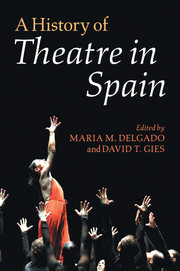Book contents
- Frontmatter
- Contents
- Illustrations
- Contributors
- Acknowledgements
- Introduction
- 1 The challenges of historiography
- 2 Lope de Vega, Calderón de la Barca and Tirso de Molina
- 3 The world as a stage
- 4 Playing the palace
- 5 The art of the actor, 1565–1833
- 6 Theatrical infrastructures, dramatic production and performance, 1700–1759
- 7 Popular theatre and the Spanish stage, 1737–1798
- 8 Theatre of the elites, neoclassicism and the Enlightenment, 1750–1808
- 9 Actors and agency in the modern era, 1801–2010
- 10 Zarzuela
- 11 Nineteenth-century Spanish theatre
- 12 Copyright, buildings, spaces and the nineteenth-century stage
- 13 Modernism and the avant-garde in fin-de-siècle Barcelona and Madrid
- 14 Continuity and innovation in Spanish theatre, 1900–1936
- 15 Theatrical activities during the Spanish Civil War, 1936–1939
- 16 Theatre, colonialism, exile and the Americas
- 17 Theatre under Franco (1939–1975)
- 18 Flamenco
- 19 Nationalism, identity and the theatre across the Spanish state in the democratic era, 1975–2010
- 20 Directors and the Spanish stage, 1823–2010
- 21 This evolution is still ongoing
- 22 Theatre as a process of discovery
- 23 Theatre is the art of the future
- Select bibliography
- Index
- References
12 - Copyright, buildings, spaces and the nineteenth-century stage
Published online by Cambridge University Press: 05 June 2012
- Frontmatter
- Contents
- Illustrations
- Contributors
- Acknowledgements
- Introduction
- 1 The challenges of historiography
- 2 Lope de Vega, Calderón de la Barca and Tirso de Molina
- 3 The world as a stage
- 4 Playing the palace
- 5 The art of the actor, 1565–1833
- 6 Theatrical infrastructures, dramatic production and performance, 1700–1759
- 7 Popular theatre and the Spanish stage, 1737–1798
- 8 Theatre of the elites, neoclassicism and the Enlightenment, 1750–1808
- 9 Actors and agency in the modern era, 1801–2010
- 10 Zarzuela
- 11 Nineteenth-century Spanish theatre
- 12 Copyright, buildings, spaces and the nineteenth-century stage
- 13 Modernism and the avant-garde in fin-de-siècle Barcelona and Madrid
- 14 Continuity and innovation in Spanish theatre, 1900–1936
- 15 Theatrical activities during the Spanish Civil War, 1936–1939
- 16 Theatre, colonialism, exile and the Americas
- 17 Theatre under Franco (1939–1975)
- 18 Flamenco
- 19 Nationalism, identity and the theatre across the Spanish state in the democratic era, 1975–2010
- 20 Directors and the Spanish stage, 1823–2010
- 21 This evolution is still ongoing
- 22 Theatre as a process of discovery
- 23 Theatre is the art of the future
- Select bibliography
- Index
- References
Summary
Theatre never exists in a vacuum but, rather, it is a lived experience that conforms to the particularities of the spaces in which it takes place, responds to the demands of its public and evolves in relation to the regulations that govern it. The laws addressing censorship, policing and the economics of the institution reveal much about how theatre functions; similarly, the participative or passive role of the audience is conditioned by the spaces dedicated to dramatic arts. In a general sense, in the early modern period, Spanish theatre migrated from mobile and exterior locales to stable and interior spaces, with alternative theatre since the mid-twentieth century returning to or evoking exterior locations. For example, Albert Boadella's radical troupe Els Joglars straightforwardly plays on medieval tradition not only in the social and political tenor of its criticism but also in the marginality of many of its performance spaces. Theatre has always been policed for morality and politics, but the system of regulation was transformed with the legislation of copyright for dramatists in the early nineteenth century. This juridical and economic innovation was concurrent with a reconceptualisation of the relationship between text and spectacle, public and performance, and censorship and morality.
Copyright
Public theatre was institutionally linked to charity throughout the sixteenth, seventeenth and eighteenth centuries, until the profound economic and social upheavals of the early nineteenth century, when a revolution of freedoms ruptured ties between the monarch and his subjects and their culture. Rather than an activity managed by the government as part of a system of self-promotion and social welfare, theatre was now a commercialised industry run by private individuals, such as the entrepreneurs Josep Cornet (dates unknown) in Barcelona and Juan de Grimaldi (1796–1872) in Madrid. Consequently, the regulation and policing of theatre changed, and new laws reconceptualised the relationship among director, dramatist and audience as one mediated through the commodity at the heart of nineteenth-century theatre: the printed text. A series of increasingly strong royal orders in 1837, 1839, 1844 and 1849 established copyright for dramatists, culminating in legislation in 1879 that would remain in full force for a century. The fundamentals of copyright shaped the changing practices of playwriting, performance and criticism of the nineteenth and twentieth centuries.
- Type
- Chapter
- Information
- A History of Theatre in Spain , pp. 244 - 263Publisher: Cambridge University PressPrint publication year: 2012
References
- 1
- Cited by



